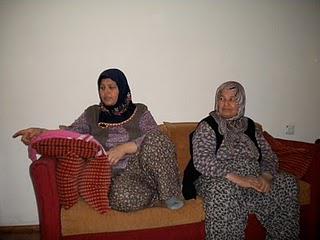If you've ever eaten in a Turkish restaurant you've heard "afiyet olsun" which Turks translate as "bon apetite" or "enjoy your meal". But it's a bit different and is said at the end of a meal as well as the beginning, which causes waiters to say "enjoy your meal" to English speakers exiting their restaurant. Eating at someone's home, the response to afiyet olsun is "elinize sagilik" (health to your hands). There's even a phrase to be said to one who has recently showered or had a haircut. Apparently swimming in the sea is included in the shower concept, because after I'd told the woman who asked about the water that it wasn't cold she said "saatler olsun" (may it be healthy for you).
Of course, foreigners aren't expected to know these courtesies. But there are some rules of etiquette that do require compliance. The only time I say Fadime get angry was when an American who had been staying with us for a few days failed to come home one night. He had moved in with a woman. When he came back to collect his things, the woman waited outside. Fadime was furious, calling the woman all sorts of names. Mehtap was laughing hysterically, shocked at Fadime's language. Mehtap and Fadime are extremely close but very different. Fadime goes to the beach covered head to toe; Mehtap turns heads in a tiny bikini.
I did get to see Fadime laugh uncontrollably once. I'd gone to the weekly pazaar and come home with a pair of salvar, the extremely baggy pants with flowered print. Fadime thought this was hilarious, and told me I looked "like a girl from the village!" I didn't see any problem with that, but I soon learned how salvar were perceived by city folk who don't wear them.

I swear salvar look different when paired with a nice top.
When my Kurdish friends came to my apartment for dinner I was wearing salvar with a sweater set. I thought I looked nice, but Mahsun immediately scolded me with "why you are wearing this? Only girls from village wear this". Where Mahsun grew up (in the village) most women wear salvar and headscarfs. His wife Nazli is "covered" but her headscarf is elegant and matches the western dress she wears over her long pants and shirt. She wouldn't be caught dead in salvar. I guess having escaped the villages of the east they like to think of themselves as higher class. I tried to argue that the fact that I wasn't wearing a headscarf and was wearing a western top would make it clear I was a foreigner. He clicked his tongue and tilted his head back slightly (Turkish for "no") and said "they will think you are crazy girl from village". He seems overly concerned with what strangers think, but okay, I say.
A month later Mahsun called to invite me to the wedding of one of Nazli's sisters. When I asked what I should wear he said it didn't matter, some people would be dressed up but others would be casual. "Only don't wear pants from village" he reminded me. So I've learned to limit my salvar use to lounging around my apartment. In fact, I'm wearing them right now.

